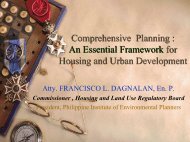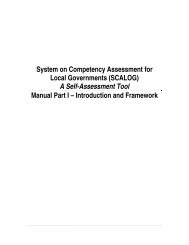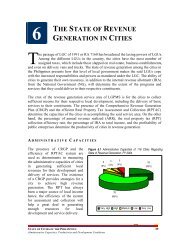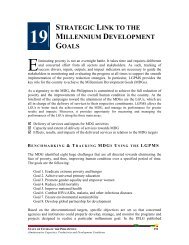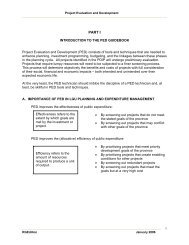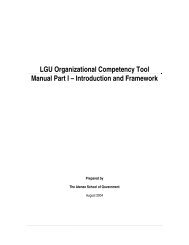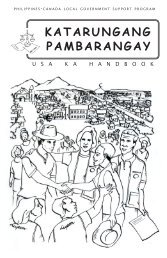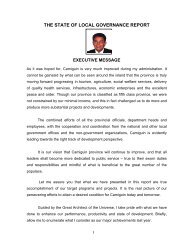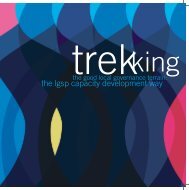Concepcion 2005 - LGRC DILG 10
Concepcion 2005 - LGRC DILG 10
Concepcion 2005 - LGRC DILG 10
Create successful ePaper yourself
Turn your PDF publications into a flip-book with our unique Google optimized e-Paper software.
III. School Children<br />
Problem Statement<br />
Thirty Three (33%) of the total school children have<br />
below normal and very low normal weight based on IRS standard.<br />
Causes & Effects of Malnutrition among School Children<br />
Poverty, ignorance and poor eating habits were the<br />
identified causes of malnutrition that resulted to low performance<br />
of children in school because of poor body condition. Most<br />
of them suffer physical and mental fatigue. Based on observation,<br />
children go to school skipping breakfast or lunch because<br />
they are afraid to be late in school because of the distance of<br />
their houses from school. Diet are not balanced consisting<br />
mainly of rice and fish. Neglect by parents to attend to the nutritional<br />
needs of their children, because they are too busy<br />
earning a living or gambling or busy taking care of younger<br />
children are the other causes.<br />
Current Interventions<br />
1. Integration of nutrition education in school curriculum<br />
and supplemental feeding through Project<br />
RAUL<br />
2. Mobilization of Parents-Teachers-Community Association<br />
3. Establishments of Gulayan sa Eskwelahan at Bakuran<br />
4. Micronutrient supplementation<br />
5. Deworming<br />
6. Ensuring foods sold at the canteen are fortified<br />
7. Promotion of use of iodized salt<br />
IV. Adolescence<br />
Problem Statement<br />
In 2003, 14% of pregnancies belong to girls aging 14<br />
to 18 years old.<br />
Causes and Effects of the Problem<br />
1. Low level of awareness among adolescence on<br />
their reproductive rights<br />
2. lack of sexuality education<br />
3. Exposure to pornographic materials<br />
4. Peer pressure<br />
5. Lack of education and guidance from parents<br />
b. Children shall not be recruited to become members<br />
of the Armed Forces of the Philippines or its<br />
civilian units armed group, or be allowed to take<br />
part in the fighting or used as guide s, or courier,<br />
or spies;<br />
c. Delivery of basic social services as education,<br />
primary health and emergency relief services<br />
shall be kept unhampered;<br />
d. The safety and protection of those who provide<br />
services including those involved in fact-finding<br />
mission from both government and nongovernment<br />
institutions shall be ensured. They<br />
shall not be subjected to undue harassment in<br />
the performance of their work.<br />
e. Public Infrastructure such as schools, hospitals<br />
and rural health units shall not be utilized for<br />
military purposes such as command posts, barracks,<br />
detachments, and supply depot; and<br />
f. All appropriate steps shall be taken to facilitate<br />
the reunion of families temporarily separated due<br />
to armed conflict.<br />
Section 24.a Evacuation of Children During Armed<br />
Conflict. Children shall; be given priority during evacuations as<br />
a result of armed conflict. Existing people’s organizations shall<br />
be tapped to look after the safety and well being of children<br />
during evacuation operations. Measures shall be taken to ensure<br />
that children evacuated are accompanied by persons responsible<br />
for their safety and well being.<br />
Section 24.b. Family Life and Temporary Shelter.<br />
Whenever possible, members of the same family shall be<br />
housed in the same premises and given separate accommodation<br />
from other evacuees and provided with families to lead a<br />
normal family life. In places of temporary shelter, expectant<br />
and nursing mothers and children shall be given additional food<br />
in proportion to their physiological needs. Whenever feasible,<br />
children shall be given proper opportunities for physical exercise,<br />
sports and outdoor games.<br />
Section 24.c. Children and Family Psycho Social Program.<br />
It is important for the children and their families that<br />
they shall be part of psychosocial program. The MSWD Office<br />
shall design a comprehensive psycho-social program for both<br />
children and their families affected by the armed-conflict.<br />
Section 24.d. Rights of Children Arrested for Reasons<br />
Related to Armed Conflict. Any child who has been arrested<br />
for Reasons Related to armed conflicts, either as combatant,



